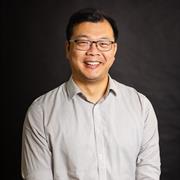
Professor Dawei Su
Details
-
Department: School of Science
-
Campus: City Campus Australia
-
dawei.su@rmit.edu.au
-
ORCID: 0000-0002-3972-8205
About
Dawei Su is a full professor in Applied Chemistry & Environmental Science at the School of Science, STEM College, RMIT University. He is the ARC Future Fellow (Level 3) and ARC Industry Fellow (Mid-Career).
Prof. Su has shown himself to be extremely capable in both Teaching and Research and the interplay of theory, best practice, and experimental cutting-edge research. Dawei has a background in material science. His research relates to advanced energy storage, conversion, and catalytical hydrogen evolution. His unique background allows him to integrate materials science and physics with chemistry and nanotechnology. This synergy combines his expertise in experimental work (synthesis, characterization, quantitative analysis) and atomic-scale and electronic-scale theoretical investigations (quantum chemistry, density functional theory, and Ab Initio molecular dynamics).
His original research related to advanced energy storage and conversion and catalytical hydrogen evolution. He is a pioneer in studying lithium-sulphur (ARENA 2016), sodium (ARC DECRA 2017 and DP 2017), lithium-ion (RailCRC 2018 and ARC LP), sodium-sulphur batteries (ARC DP 2024), photo/electrochemical water splitting (ARENA 2024) and moisture electric generator (ARC DP 2023) supported by over $5 million in competitive funding.
Dawei established himself as an internationally recognised leader in materials science research. He has over 170 papers in the field, including in prestigious journals such as Science Advances and Advanced Materials (He is in first or/and the corresponding author for over 90 papers). His publications are highly evaluated and extensively cited more than 16000 times with an H-index of 67 (Google Scholar), placing him in the top 1% of the citation metrics within the discipline and the field of science overall for his career stage.
Because of the scientific impact of his work and achievement, he was nominated as a ‘Rising Star and Leader of the Future in Materials Engineering’ by The Australian in 2021 and the ‘Best Rising Stars of Science in Australia 2022 and 2023 Ranking (Materials Science discipline)’ by Research.com.
He is dedicated to equipping students with self-motivation for life-long learning through bridging theoretical chemistry knowledge with cutting-edge technology. By involving students in both fundamental theories (to answer “why”) and state-of-the-art research activities (to deliver “how” and “what”), he empowers them to develop strong professional identities and contribute to scientific advancements. He contributed to the approach to teaching and the support of learning that influences, motivates and inspires students to learn, evidenced by continuously favourable comments from students, enhanced student engagement in the classes and assessment results.
He was awarded the School of Mathematical and Physical Sciences Teaching & Learning Award Nomination – Individual Award at University of Techonology Sydney in 2024 for recognizing his devoting on Bridging the Theoretical Chemistry Knowledge with State-of-Art Practical Applications has won the Individual Award under the criterion of Approaches to teaching and the support of learning that influence, motivate and inspire students to learn.
Prof. Su has served as an associate editor for Battery Energy (Wiley) and Frontiers in Chemistry: Inorganic Chemistry and on editorial boards for several journals (InfoMat (Wiley), InfoScience (Wiley), and Nano Research Energy (Springer), etc.). He has organised several workshops and conferences relating to his discipline area. Prof. Su is also a key member and serving for the Australia Battery Society (ABS) and a board member of the Australasian Practical Zero Emissions Society (APZES).
Supervisor projects
- Unveiling Electronic Interactions in Emerging Electrocatalysts for Water Splitting: From Prussian Blue Analogues to Two-Dimensional Materials
- 13 Aug 2025
- Design high energy density and stable Sodium-Sulfur Batteries
- 10 Jul 2025
- The study of BiOX/TiO2 heterojunction membranes for photocatalytic hydrogen production from wastewater
- 19 Jun 2025
Teaching interests
He is dedicated to equipping students with self-motivation for life-long learning through bridging theoretical chemistry knowledge with cutting-edge technology. By involving students in both fundamental theories (to answer “why”) and state-of-the-art research activities (to deliver “how” and “what”), he empowers them to develop strong professional identities and contribute to scientific advancements. He contributed to the approach to teaching and the support of learning that influences, motivates and inspires students to learn, evidenced by continuously favourable comments from students, enhanced student engagement in the classes and assessment results.
He was awarded the School of Mathematical and Physical Sciences Teaching & Learning Award Nomination – Individual Award at University of Techonology Sydney in 2024 for recognizing his devoting on Bridging the Theoretical Chemistry Knowledge with State-of-Art Practical Applications has won the Individual Award under the criterion of Approaches to teaching and the support of learning that influence, motivate and inspire students to learn.
Research interests
He is leading the research programs (ARC DECRA, DP, LP, LIFE’s and ARENA, CRC, amongst others) centred on unveiling the material’s electrochemical or photochemical properties correlated with their electronic structures via the combination of in-situ spectroscopies and theoretical investigations. He has driven fundamental advances in designing chemically and structurally tunable materials and uncovering the impact of materials’ properties on electro(photo)chemical performance.


